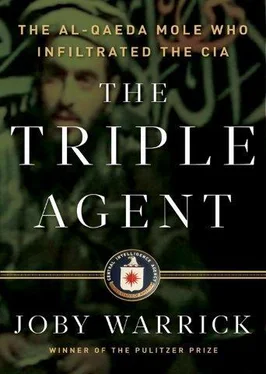He could be leading you into an ambush , the Jordanian officer warned.
As he summed up his thoughts, the official acknowledged that the Mukhabarat had found nothing damning against Balawi and had no specific reason to doubt that the operative had truly made inroads into al-Qaeda’s senior ranks. There were just vague concerns, he explained, including a worry that bin Zeid might not be the right officer for this particular case. Perhaps over time bin Zeid had gotten too close to his recruit and had lost his ability to make dispassionate judgments.
The Jordanian had finished unburdening himself, so the CIA officer thanked him for his insights and bade him good night. Afterward, as he thought about the warning, he focused in particular on one of the phrases the man had used: bin Zeid might not be the right officer .
The Mukhabarat, for all its strengths, was known to be constantly roiled by rivalries and turf battles, as different factions sought to gain advantage. Even mild-mannered bin Zeid was reported to have numerous enemies among senior officers who feared that the king’s cousin would use his royal heritage and CIA connections to secure a plum position.
The warning suddenly made sense. The Jordanians were worried all right: They were afraid that Ali bin Zeid would soon become their boss, the CIA officer reasoned. He filed the contact away mentally and mentioned it to no one outside of Amman.
The next morning, under a slate gray sky, bin Zeid and LaBonte boarded a plane at Amman’s Queen Alia International Airport and departed for Afghanistan.
Khost, Afghanistan—December 2009
Just after sunset on Christmas Day, Jennifer Matthews plopped down in front of her computer and switched on the small Web camera clipped to the top of the screen. It had been a rough day, and though she didn’t know it yet, things were about to get worse. At that hour a Northwest Airlines flight from Amsterdam was closing in on Detroit, carrying a young Nigerian passenger who had hidden eighty grams of military explosive in his clothes. The Nigerian’s attempt to blast the plane from the sky would ring alarm bells at CIA stations around the world and keep counterterrorism officers busy through the night. Yet back home in snow-covered Fredericksburg, Virginia, it was still blissfully quiet, and Matthews’s kids would be waiting to open their Christmas presents. She would join them via Skype.
She clicked “home” and waited for the connection. In a few seconds a small video panel appeared, and Matthews was looking at the twinkling lights of a Christmas tree in her own family room.
“Hi, Mommy,” came the chorus of greetings from her three children.
Matthews’s husband had set up the video connection so the kids could see their mother during their regular chats while she was overseas. The couple had planned in advance to celebrate Christmas morning this way, with Matthews’s parents joining the gathering to spend the holiday with their daughter’s likeness on the video screen. They would all try to make the day as normal as possible.
Matthews caught up with the family news, and then everyone unwrapped presents, first the kids, then their mother, who opened gifts that had been sent to her in Afghanistan weeks earlier. After that was done and the small talk had waned, Matthews’s youngest child, a six-year-old boy, piped up with a question. “Mommy, can you show us your gun?”
Everyone laughed, but Matthews dutifully complied. She picked up the rifle she kept in her hooch and then unholstered her pistol as well. Her questioner beamed. Not many of his friends’ moms had their own assault rifles.
The conversation halted when an aide rapped on the door to announce that dinner was ready in the mess hall. It was a special holiday meal, and Matthews as base chief would be expected to attend. After a few good-byes and blown kisses, Matthews was back at work in Afghanistan. She grabbed her heavy coat and flak jacket and headed to the dining room.
The day in Khost had been overcast and raw, adding to the gloomy pall that had settled over the base in the past two weeks. Until December life for Khost’s new base chief had seemed manageable and predictable and even somewhat ordinary. She had adjusted to the long hours and settled into roles that had initially seemed foreign to her. She went for a run almost every day and was losing weight. She was beginning to appreciate how quickly a year could pass at a busy base like Khost.
Then Humam al-Balawi came along.
Matthews had become aware of the Jordanian informant in the early fall, but until recently neither she nor Khost had had anything to do with him. Balawi was Amman’s recruit, and he was being managed by Langley and the CIA’s Islamabad station. But now it had been decided that Balawi would come to Khost and Matthews would play host.
Normally such an opportunity would be thrilling for a new base chief looking to cement her reputation. But after weeks of waiting and endless quarreling about arrangements—with her staff, with Langley, and, indirectly, with the informant himself—her enthusiasm was gone.
Multiple outsiders, including CIA chiefs in Langley, Amman, and Kabul, wanted to be in on the Balawi operation. But no one person was clearly in control. Meanwhile Balawi might show up at Khost tomorrow, or the next day, or maybe not at all.
At least the first problem, of control, could be fixed. Matthews had never been shy about asserting herself. Yes, her decisions were being challenged, but if it happened on her base, Jennifer Matthews decided, she would be in charge.
The pressure had been exquisite. Perhaps two dozen people in the world knew about the pending visit by Humam al-Balawi, but one of them happened to reside at 1600 Pennsylvania Avenue in Washington. President Barack Obama, in his second briefing about Jordan’s “golden source,” had been told of CIA plans to meet with the informant in Afghanistan. He knew that the man would be scrutinized and vetted by an agency team and then armed for his mission against one of America’s most determined adversaries, al-Qaeda’s No. 2 leader, Ayman al-Zawahiri. The president of the United States would be awaiting news of the extraordinary events at Khost.
As the person in charge of the details of Balawi’s visit, Matthews sat down at her computer one wintry afternoon to create the most important ops plan of her life. She had to devise a way to transport Balawi to Afghanistan, win his cooperation, provide training, and send him home again without being missed or noticed. In two decades of CIA work, nothing she had written had come close to this. Many weeks later agency veterans studied Matthews’s plan and marveled at its elegant simplicity.
Timing would be critical. As Matthews figured it, the CIA had about nine hours, just barely longer than a Washington workday, to accomplish all of it. The first hurdle was the extraction from Pakistan. Balawi could find his way to the border town of Ghulam Khan, but he would need help crossing the border and the Taliban-infested mountains beyond. Helicopters were out of the question, and sending SAD officers or other Americans would be too risky, she decided. They would draw attention to the informant, and if they were stopped, they would likely be kidnapped or killed. A trusted Afghan would be sent to the border instead.
Balawi would need a cover story—a plausible reason to be away from his Taliban hosts for several hours—and the CIA came up with a clever one. As Zawahiri’s new doctor he needed to go to Miranshah to find medicine for his famous patient. The agency would provide Balawi with a package to take home with him: pills and salves to relieve the old diabetic’s poor circulation and skin problems.
Читать дальше












